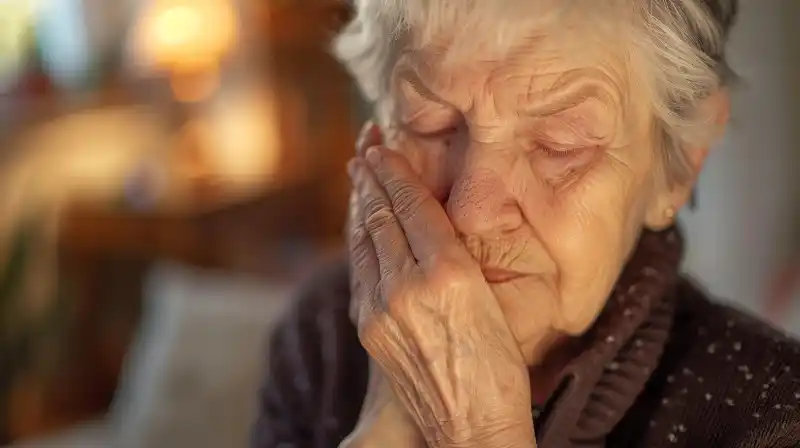As we age, our skin becomes more vulnerable to conditions like atopic dermatitis, a discomfort many seniors know all too well. This chronic skin disorder goes beyond mere dryness and irritation – it can significantly impact quality of life.
Our guide breaks down the key signs of this condition that shouldn’t be overlooked, providing insights on effectively managing symptoms. Keep reading for essential tips every senior should consider for healthier skin.
Key Takeaways
- Seniors with very dry and itchy skin may have atopic dermatitis, a condition where the skin barrier does not work well. This can lead to more infections.
- Keeping skin moist is important in managing atopic dermatitis. Use fragrance-free creams and avoid irritants like harsh soaps to prevent flare-ups.
- Early detection of atopic dermatitis helps manage the condition better. It’s vital for seniors to look out for symptoms such as redness, swelling, or cracked skin and seek medical attention when needed.
- Seniors should wear comfortable clothes and use gentle skincare products every day. Stress management also plays a role in controlling symptoms.
- There are many treatment options for seniors with atopic dermatitis. These include moisturizers, prescription creams, light therapy, and new medications that target immune responses.
Understanding Atopic Dermatitis

Atopic dermatitis is a chronic skin condition that makes your skin red, swollen, and very itchy. It’s more than just dry skin. This disease often starts in childhood but can continue or show up in adulthood too, including when you’re a senior.
Your immune system and genetics play roles here. Sometimes the environment you’re in affects it as well.
Your skin works like a shield protecting your body from germs and the weather. But if you have atopic dermatitis, this shield doesn’t work as well. The result? Moisture escapes and irritants get in easier, which can make your skin more prone to infections and allergies.
As you get older, these problems may happen more often because aging skin tends to be drier with weaker defenses against irritation.
Signs of Atopic Dermatitis in Seniors

In seniors, atopic dermatitis presents distinct signs that cannot be disregarded due to their potential impact on overall health and quality of life. Recognizing these symptoms early is crucial for managing the condition effectively and preventing its progression.
Dry, Cracked Skin
Dry, cracked skin is not just uncomfortable; it’s a common sign of atopic dermatitis. Your skin might look scaly and feel rough to the touch. This happens because your skin loses water more easily, which damages its natural barrier.
A weak barrier means irritants can get in and moisture goes out, leading to even drier skin.
You may notice this most on your hands, feet, elbows, or knees. If your skin is very dry, small cracks can form. These cracks make way for infections and cause more itching and irritation.
To help stop dryness from turning into a bigger problem, keep your skin moisturized with lotions that are fragrance-free and hypoallergenic – especially after bathing when your skin is still damp.
Itchiness (pruritus)
You may notice your skin feels itchy often, which is a key sign of atopic dermatitis. This feeling, known as pruritus, can be constant and nagging. It might not always come with a rash or visible changes on your skin surface.
Seniors sometimes call this aggravating itch “winter itch” or “seventh age itch.” The sensation is due to dryness and cracks in the skin that let irritants in and moisture out.
Your need for scratch relief could lead you to rub or scratch the affected areas. While doing so might feel good momentarily, it can actually make things worse by further breaking down your skin barrier.
It’s important to find gentle ways to soothe the discomfort without damaging your skin.
Rash on swollen skin
Rashes from atopic dermatitis can change based on your skin color. If you have brown or black skin, watch for small, raised bumps. These can be signs of the condition. Skin might ooze and form a crust, which is common with this type of rash.
Dryness often comes before swelling and inflammation. Itchy feelings happen because the skin barrier isn’t working well.
Keep an eye on these changes in your skin’s texture and color. Treatments are available to help soothe symptoms like itchiness and prevent infection. Moisturizing regularly with products like petroleum jelly can protect against dryness that leads to rashes.
Ensuring proper skin care daily helps maintain healthy skin despite having chronic eczema or atopic dermatitis.
Complications of Coexisting Disorders and Malignancy
Having atopic dermatitis can lead to more issues if you already have other health problems. Sometimes people with this skin condition also have high blood pressure. Their bodies are dealing with two things at once, which can make each one worse.
This is especially true for older adults.
Skin cancer and lymphoma are types of cancer that might happen more often in people with long-term or severe skin inflammation like eczema. It’s not common, but it is something to be aware of.
If your skin changes a lot or you feel unwell, it’s important to talk to a doctor right away. They can check your symptoms and help keep you healthy.
How Atopic Dermatitis is Diagnosed in Seniors
Doctors look at your skin and ask about your symptoms to diagnose atopic dermatitis. They will check for areas where the skin is dry, red, or itchy. The pattern of these signs can help tell if you have the condition.
You might also be asked about family health history because genetics play a role.
Your doctor may perform a patch test to see if you have allergies that cause your skin to react. A small area on your skin gets exposed to different substances. Afterward, the doctor looks for any changes.
This helps them figure out what might be triggering your rash. No blood tests are needed just to diagnose atopic dermatitis in seniors.
Causes of Atopic Dermatitis in Seniors
Atopic dermatitis in seniors is a multifactorial condition where complex interactions between genetic predispositions and environmental exposures play significant roles. With advancing age, changes within the immune system and skin integrity contribute to the heightened vulnerability to this chronic skin disorder.
Genetics
Genes play a big role in whether you get atopic dermatitis. If your family has a history of skin issues or allergies, you might be more likely to have it too. Scientists have seen that certain gene changes can pass from parent to child.
These changes can make the skin barrier weak, leading to dry and sensitive skin.
Your genes could also affect how your immune system works. With atopic dermatitis, the immune system can overreact, causing inflammation and that uncomfortable itchiness. This response is part of why some people with eczema also have asthma or hay fever—it’s all linked together.
Immune System
Your immune system works hard to protect you from infections and diseases. With atopic dermatitis, your immune system can react too strongly to certain triggers. The result is inflammation that leads to itchy skin and rashes.
Genetics play a part, but so do immune-related responses in your body.
In older adults like you, the immune system may not work as well as it used to. This change can make skin conditions worse or more common. Remember, proteins like IL-4 and IL-13 are involved in allergic reactions and are often elevated in people with atopic dermatitis.
They cause an increase in IgE antibodies which are linked to allergic symptoms that might make your skin feel uncomfortable or even painful. It’s important to take care of your skin health by understanding how these factors affect you personally.
Environmental Factors
Many things around you can make atopic dermatitis worse. Dust, pollen, and pet dander are common triggers. They can make your skin itchy and red. Strong soaps, detergents, and certain fabrics may also irritate your skin.
Try to stay away from these if you can.
Your home’s air quality matters too. Dry air can suck moisture out of your skin, leading to dryness and itchiness. Using a humidifier might help keep your skin from getting too dry.
Also, think about what you wear. Clothes made of cotton are usually better for sensitive skin like yours.
Risk Factors for Atopic Dermatitis in Seniors
If you’ve had skin problems like eczema, or if allergies and asthma are part of your past, these issues could make atopic dermatitis more likely now. Your skin gets drier and less able to protect itself as you age.
This can lead to more water loss from the skin. That makes it easier for atopic dermatitis to develop.
Family history plays a big role too. If your relatives have had any atopic diseases, especially atopic dermatitis, that increases your chances. Keep in mind that where you live and what’s around you matter as well.
Allergens like dust mites or pet dander in the environment can trigger the condition or make it worse.
Complications of Atopic Dermatitis in Seniors
Older adults with atopic dermatitis may deal with more serious complications. These can include severe dry skin, intense itching, and a weaker skin barrier. Dryness gets worse because their skin loses water quicker as they age.
This loss makes it easier for germs to get in and cause infections.
Seniors might also get bacterial, fungal, or viral skin infections from atopic dermatitis. These infections can lead to lasting scars on the skin. It’s important that seniors take care of their skin to prevent these problems.
Prevention Strategies for Atopic Dermatitis in Seniors
Keep your skin moist to fight off atopic dermatitis. Use creams and ointments every day, especially after a bath or shower. This locks in moisture. Choose products without dyes or perfumes to lower the risk of skin irritation.
Shea butter can also be very soothing for dry skin.
Wear soft fabrics like cotton to avoid scratching. Harsh fibers can make your skin itch more. Stay cool as heat can make itching worse. Try not to scratch itchy areas too much; this might cause infections or thicker skin over time.
Keep nails short and clean to help prevent damage from scratching.
Carefully pick soaps and laundry detergents that are mild and designed for sensitive skin. Avoid known triggers such as harsh chemicals, scented products, or wool clothing which may worsen symptoms.
Manage stress through relaxation techniques because stress can trigger flare-ups.
Watch what you eat if food allergies play a role in your eczema flares—keep track of how foods affect your condition with a diary or note-taking app on your phone.
Treatment Options for Atopic Dermatitis in Seniors
Exploring a variety of treatment options for atopic dermatitis can help seniors manage their symptoms effectively and improve their quality of life.
Basic Treatments
Moisturizing regularly helps manage atopic dermatitis. Choose creams that soothe your skin and use them daily. Combining moisturizers with topical corticosteroids can reduce inflammation.
Calcineurin inhibitors are also an option to suppress the immune response causing the rash. These treatments aim for itch relief and keeping skin lesions under control.
Apply these creams as directed by your doctor, usually twice a day. Topical therapies like these are effective in maintaining healthy skin barriers, especially if you start early when you first notice symptoms of atopic dermatitis.
Stick with the routine to keep your skin calm and comfortable.
Additional Treatment Options
Light therapy, or phototherapy, can help treat atopic dermatitis in seniors. This method uses UVB rays to reduce itchiness and inflammation. It’s safe for many people but always check with your doctor before starting.
Some seniors might benefit from drugs that change the immune system’s reactions. Drugs like cyclosporine, methotrexate, or mycophenolate can ease symptoms. Remember these shouldn’t be used for a long time due to side effects.
Always discuss risks and benefits with your healthcare provider before using these treatments.
New Drugs
Exciting breakthroughs in eczema treatment are on the horizon for you. Scientists have developed new medications that could transform how atopic dermatitis is managed. They target the underlying causes of the condition, not just its symptoms.
These drugs work by changing how your immune system responds to triggers.
Your doctor might talk about treatments that go beyond creams and ointments. For example, biologics are a type of drug designed to block specific substances in your immune system. Research trials show these can really help reduce skin inflammation and relieve itching.
Remember, it’s important to discuss all options with your healthcare provider before starting any new medication.
Living with Atopic Dermatitis as a Senior
Coping with atopic dermatitis can be a daily challenge for seniors. The constant itchiness and dry skin can disrupt sleep and make everyday activities tough. Taking care of your skin should become part of your routine.
Use gentle soaps, apply moisturizers frequently, and wear soft fabrics to minimize irritation.
Managing flare-ups involves more than just skin care. Stress can trigger symptoms, so finding ways to relax is important. Breathing exercises, meditation, or hobbies that keep you calm will help control outbreaks.
Stay connected with friends and family who understand what you’re going through; support makes a big difference in handling this chronic condition effectively.
When to Seek Medical Attention for Atopic Dermatitis
Go to the doctor if your skin gets very bad, very itchy, or bleeds. This can mean your atopic dermatitis is getting worse and you might need different treatment. If you get a fever or see red streaks around the rash, go to the doctor quickly.
These signs can mean there is an infection. Sometimes sores have yellow crusts or pus in them. That’s also when it’s important to see a doctor.
Your doctor may give you creams to put on your skin or suggest other treatments that will help. It’s good to keep seeing your doctor regularly, especially if new symptoms show up or things don’t get better with the treatment you’re using now.
If breathing becomes hard or if swelling happens on your face, mouth, or eyes after using any medicine for atopic dermatitis, go to the hospital right away because these can be signs of a serious allergic reaction.
Key Points about Atopic Dermatitis in Seniors
Atopic dermatitis in seniors often shows up as itchy, dry skin. Older adults may also have redness and swelling from scratching. Skin gets less able to hold water as people age, which can make atopic dermatitis worse.
Even though there’s no cure, you can manage and sometimes stop outbreaks with the right care.
Good skincare is key for managing atopic dermatitis in seniors. This means keeping skin moist and avoiding irritants that cause flare-ups. Staying away from harsh soaps and scratchy fabrics helps too.
Working with a doctor to create a treatment plan is important for controlling symptoms and improving life quality with atopic dermatitis.
FAQs
1. What are the common symptoms of atopic dermatitis in seniors?
Seniors with atopic dermatitis often experience a skin rash, dryness, and itching. These signs can lead to lacerations from scratching and increase their chance of getting infections like staphylococcus aureus.
2. Can atopic dermatitis affect a senior’s emotional well-being?
Yes, chronic diseases like atopic dermatitis can lead to emotional issues such as depression and anxiety due to the persistent discomfort and appearance concerns.
3. Are there specific treatments for seniors with atopic dermatitis?
Treatments include moisturizing dressings, topical treatments like tacrolimus, oral antibiotics if infection is present, phototherapies such as UVB therapy, and immunosuppressive drug therapy tailored for the individual.
4. How does allergic rhinitis relate to atopic dermatitis in seniors?
Allergic rhinitis is an inflammatory condition that often co-occurs with other atopic disorders including eczema or contact allergy which may worsen symptoms of both conditions.
5. What role do genetic factors play in developing atopic dermatitis later in life?
Genetic factors contribute significantly; they impact the function of corneocytes in the stratum corneum leading to a weakened skin barrier which increases susceptibility to irritants causing allergic contact dermatitis or triggers neurodermatitis flare-ups.
6. Is immunotherapy an option for treating senior’s atopic dermatitis associated allergies?
Yes, allergen-specific immunotherapy may be beneficial by reducing sensitivity to specific allergens potentially improving related eczematous lesions over time when combined with traditional therapies.
Source Links
- https://www.ncbi.nlm.nih.gov/pmc/articles/PMC7044141/
- https://www.webmd.com/skin-problems-and-treatments/eczema/ss/slideshow-eczema-in-older-adults
- https://bpac.org.nz/bpj/2014/september/dryskin.aspx
- https://www.hopkinsmedicine.org/health/conditions-and-diseases/eczema
- https://www.niams.nih.gov/health-topics/atopic-dermatitis
- https://my.clevelandclinic.org/health/diseases/24299-atopic-dermatitis
- https://healthlibrary.umcno.org/YourFamily/OlderAdults/Tools/3,84485





